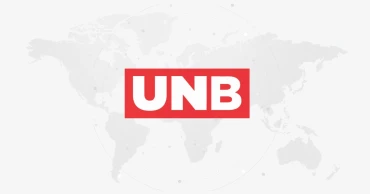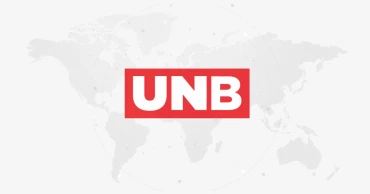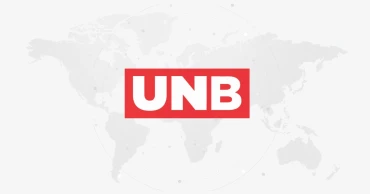primary school students
Bangladesh signs agreement with WFP to expand school feeding programme
Bangladesh has signed an agreement with the World Food Programme (WFP) for expanding and improving school feeding programme for the country's primary school students.
The agreement was inked in an event attended by Foreign Minister AK Abdul Momen.
Bangladesh government introduced a school feeding programme in 2010 and now some 23 lakh students of 15,000 primary schools in 104 upazilas are getting free meals.
Read: PM Hasina offers Nepal use of Payra port during meeting with Nepalese counterpart in Rome
Under the new agreement, the school feeding programme will be expanded to more than 150 upazilas, raising the number of beneficiaries to 37 lakh students. Besides, fruits, milk, bread, eggs and other nutritious foods will be served instead of fortified biscuits.
Thanks to the feeding programme, the dropout rate has declined by 7.5 percent and the enrolment rate has increased by 14 percent in the primary schools, said Momen.
Read: Bangladesh-Bangabandhu Sheikh Mujib Room opened at FAO Headquarters
Moreover, Bangladesh has become the 85th member of the School Meals Coalition at an event here on Monday.
Bangladesh Ambassador to Italy Md Shameem Ahsan and PM’s speechwriter Md Nazrul Islam were present.
2 years ago
Bangladesh rolls out Covid vaccination programme for kids
Bangladesh on Thursday rolled out a full-fledged Covid-19 vaccination programme for children aged between 5 and 11 years in city corporation areas across the country.
This vaccination programme will continue for the next 14 days, from 9am to 3pm daily.
The government has set a target to vaccinate 2.20 crore children aged between 5 and 11 years (mostly primary school students) under this programme.
The vaccination programme was officially inaugurated at Nilkhet Government Primary School in the capital around 9am, in the presence of State Minister for Primary and Mass Education Zakir Hossain.
The Pfizer vaccine for children is being administered in 186 centres across 12 city corporations, the State Minister said.
Read:Children aged 5-11 to get Covid jabs at schools: Minister
In Dhaka, children will be vaccinated at 21 centres in two city corporation areas.
This vaccination drive will be carried out soon at school and community levels of districts, upazilas and municipalities, said the State Minister.
At the same time, street urchins or children who are school dropouts will also be vaccinated under this programme, he added.
Street children can get the jab through direct spot registration from booths at ward levels and various schools. Students can get the jab by showing their vaccination cards through online registration.
Red Crescent and BRAC volunteers are working in this programme.
The country received about 30 lakh doses of the Pfizer vaccine for children through the COVAX facility. The vaccine has been approved by the Directorate General of Drug Administration.
On August 11, Bangladesh started administering Covid-19 jabs to children aged between 5 and 11 years on an experimental basis.
3 years ago
Primary school students return to campus
As physical classes resumed for primary school students after yet another Covid-induced closure, students were excited to return to campus on Wednesday.
All primary-level educational institutions reopened on Tuesday after over a month of closure due to a renewed surge in Covid-19 cases largely due to the Omicron strain.
School staff, particularly teachers, made an extra effort to give the children a warm welcome, also ensuring adherence to all Covid-safety protocols.
Read: SSC exams likely from June 19, HSC from Aug 22
In view of the declining Covid cases across Bangladesh, the government on February 18 announced the resumption of in-person classes at primary schools from March 1.
In-person classes at all secondary, higher secondary and university-level educational institutions resumed on February 22.
On January 21, the government announced the closure of all schools and colleges in Bangladesh from January 21 to February 6 amid the fresh surge in Covid-19 cases.
The shutdown was extended till February 20 for the safety of the students as the virus continued to spread.
The following day, the Education Ministry issued an 11-point directive, including the resumption of online classes for schools and colleges.
Read: IU officials continue work abstention
Besides, the vaccination of students, aged between 12 and 17 years, against Covid-19 was directed to be continued following the health guidelines in coordination with the zonal offices of the Directorate of Secondary and Higher Education, District Education Offices, Upazila Secondary Education Offices, local administrations and Civil Surgeons.
After an initial 17-month Covid-induced closure, the students in Bangladesh returned to their classrooms on September 12 last year.
The government initially shut the educational institutions on March 17, 2020, after the country reported its first Covid-19 cases on March 8 and later the closure was extended several times.
4 years ago
Ecnec rejects Tk 17,290-cr primary school meal project
The Executive Committee of National Economic Council (Ecnec) on Tuesday turned down a Tk 17,290.23-crore project designed to provide ‘Khichuri’ or other food items as midday meals to primary school students.
“The project hasn’t been approved as the Prime Minister is concerned about its structure (modus operandi). She said cooking Khichuri in schools might hamper the study of students,” said Planning Minister MA Mannan.
The minister was briefing reporters after an Ecnec meeting held at the NEC conference room in the city.
Ecnec Chairperson and Prime Minister Sheikh Hasina chaired the meeting, joining it virtually from her official residence Ganobhaban.
Also read: All above 14 to get smart NIDs; Ecnec clears project
The meeting, however, cleared nine other projects involving an estimated total cost of Tk 5,239.62 crore, the minister added.
Of the cost, he said, some Tk 250 crore will come as loan from foreign sources.
Among the nine projects, six are fresh and three others revised ones.
About the midday meal project, Mannan said the project will not be placed for approval anymore, but new projects over the midday meal may come in different formats.
4 years ago
Bringing smiles to children of lesser God
For Monika Devi, life is tough as a homemaker in a poor family in Chattogram’s Fakirhat village that is struggling to make ends meet. Her only hope to break free from the current situation is by educating her only child.
After a gap of nearly six months, Monika finally received her child's stipend of Tk 900 in her mobile phone wallet this month -- a direct cash support that has come as a blessing for the family in times of Covid-induced economic crisis.
"Cash support during any financial crisis always gives poor people like us a little more confidence. Moreover, I didn't have to go to the town to collect the stipend money this time. Nagad's facility is right next to our house," she told UNB.
Monika's one of many such happy stories from poor households in Bangladesh that have had their lives changed since Prime Minister Sheikh Hasina's government introduced the direct cash transfer system to curb corruption by breaking the cycle of dependence.
In fact, by the end of May, some 10 million primary school students in Bangladesh would get stipends worth Tk 900 crore through direct cash transfers. The system involves the payment of the stipends directly to the mother of each student through mobile banking services.
Also read: Teacher shortage hits govt primary schools in Cumilla hard
The Primary Education Stipend Project (PESP) provides a stipend of Tk 150 a month per child to poor mothers, with a rider that their ward must attend school. This is apart from a one-time allowance of Tk 1,000 a year for the purchase of educational materials.
Earlier the stipend was paid in the form of cash from a designated school in the vicinity of the beneficiary's residence.
Official sources said the money disbursed through mobile wallets this month was actually the amount pending for the last two quarters of 2020 -- July to September and October to December 2020. The disbursement was delayed to ensure full transparency in the system.
"Earlier mobile financial services firm SureCash used to handle the disbursement. But now Nagad, a mobile financial service of the Bangladesh Post Office, has been roped in. This was after allegations of irregularities came to fore," said sources.
Also read: Thousands of students throng cyber cafes to apply for stipends in Panchagarh
When contacted, Md Yousuf Ali, project director, PESP, said teachers often faced problems in maintaining multiple registers and ledgers under the earlier traditional cash distribution system. "Disbursing stipends through mobile banking services eliminated all such hassles."
"Though we have been distributing the stipends through SureCash, state-run Nagad has now been roped in for the same. The migration to another financial services platform delayed the disbursement of the stipends for the last two quarters of 2020," he added.
According to Md Yousuf, stipends for the first two quarters of this calendar year (January to March and April to June), along with Tk 1,000 for the purchase of educational materials, will be disbursed by the first week of June. "Nagad will also carry out awareness campaigns."
An official of Nagad said that the mobile financial service of the Bangladesh Post Office has already disbursed the government’s stipend for primary and mass education to the mobile wallets of 10 million mothers, "maintaining highest degree of digital security".
Ganesh Pal Dipu, the headmaster of Amberkhana Colony Government Primary School in Sylhet, hailed the initiative as a landmark achievement of the Bangladesh government.
"The direct cash transfer through mobile wallets has eliminated all the tedious process. Nagad has created a national database to send money to the mobile wallets of mothers, and this is no doubt a landmark initiative," he said.
Nasrin Parvin of Satkhira Sadar upazila has also received her daughter's stipend in her Nagad account. "I have already withdrawn the money from a Nagad entrepreneur, who has an outlet next to our house," she said.
On the distribution of stipends, Tanvir A Mishuk, managing director of Nagad, said, "Timely decision made it possible for us to hand over the government’s financial assistance to marginalised people even during the lockdown."
“It also a great joy for me that the stipends of the million young stars are distributed through Nagad. And I am very proud that Nagad can contribute its bit to build the future of Bangladesh as a process of supporting the students’ enrollment in schools."
4 years ago
86,452 primary students get stipend, allowance through Nagad in phase 1
The government on Monday disbursed stipends and allowances among 86,452 primary school students through Nagad.
5 years ago
Bangladesh Betar to air lessons for primary students from Aug 12
Bangladesh Betar will start broadcasting lessons ‘Ghore bose shikhi’ for primary school students from August 12 so that students could continue academic activities amid the coronavirus pandemic.
5 years ago

.jpg)


.jpg)
.jpg)



